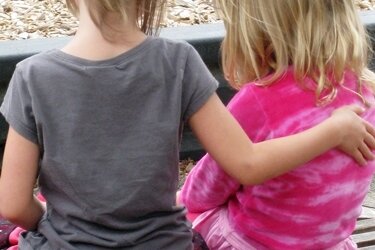
Education and Peace
— Lao Tzu“If there is to be peace in the world, there must be peace in the nations.
If there is to be peace in the nations, there must be peace in the cities.
If there is to be peace in the cities, there must be peace between neighbors.
If there is to be peace between neighbors, there must be peace in the home.
If there is to be peace in the home, there must be peace in the heart.”
Sometimes it seems like peace in the heart is in short supply. Bomb blasts in Baghdad, civil unrest in Ferguson, Missouri, and yet another tragic school shooting less than 50 miles away. Our hearts go out to those who are suffering pain and loss. It feels especially shocking when terrible things happen in schools, which should be physical and psychological safe havens. Fire, earthquake, lockdown procedures – we practice these so that we know what to do in the event of an emergency. It’s always the hope that we never have to do them for real.
Dr. Maria Montessori began her work with children in the early 20th century, establishing her first Casa dei Bambini (“Children’s House”) in 1907. She lived and worked through the First World War, and in the 1930s saw war clouds gather once again over Europe. She was profoundly concerned with the question of peace and viewed education as the root of human and social development for the betterment of our world. She believed that true, lasting peace would only be attained if we met the needs of the Universal Child – of all children.
Here are a few excerpts from speeches Montessori gave during the 1930s and ‘40s, collected in the volume, Education and Peace*:
Our principal concern must be to educate humanity – the human beings of all nations – in order to guide it toward seeking common goals. We must turn back and make the child our principal concern. The efforts of science must be concentrated on him, because he is the source of and the key to the riddles of humanity. The child is richly endowed with powers, sensitivities, and constructive instincts that as yet have neither been recognized nor put to use. In order to develop, he needs much broader opportunities than he has been offered thus far. Might not this goal be reached by changing the entire structure of education? Society must fully recognize the social rights of the child and prepare for him and the adolescent a world capable of ensuring their spiritual development…Perhaps the attainment of peace would then be easy and close at hand, like waking from a dream, like freeing ourselves from a hypnotic spell. (p. 27)
Education today is still confined by the limits of a social order that is now past. Education today not only is contrary to the dictates of science; it also runs counter to the social needs of our time. Education cannot be dismissed as an insignificant factor in people’s lives, as a means of furnishing a few rudiments of culture to young people. It must be viewed first of all from the perspective of the development of human values in the individual, in particular his moral values, and second from the point of view of organizing the individuals possessed of these enhanced values into a society consciously aware of its destiny…education that represses and rejects the promptings of the moral self, that erects obstacles and barriers in the way of the development of intelligence, that condemns huge sectors of the population to ignorance is a crime. Since all our riches come from man’s labour, it is absurd not to regard man himself as the most fundamental of our riches. We must seek out, we must cultivate, we must enhance the value of man’s energies, his intelligence, his creative spirit, his moral powers so that nothing is lost. (p. xiii)
It’s striking how much these words resonate in 2014. As far as we have come, there are still far too many children growing up without getting their physical, social, spiritual, academic, and psychological/emotional needs met—who don’t have peace in the heart. We take hope in all the moments we see here, big and small, in which children work out their differences respectfully; show kindness, compassion, and empathy for one another; exhibit caring and concern for those who need help; and learn friendliness with error, for it is largely through our mistakes that the greatest learning comes. In the words of Maya Angelou, “I’ve learned that people will forget what you said, people will forget what you did, but people will never forget how you made them feel.”
*Education and Peace (Amsterdam: Montessori-Pierson Publishing Company, 2007)
